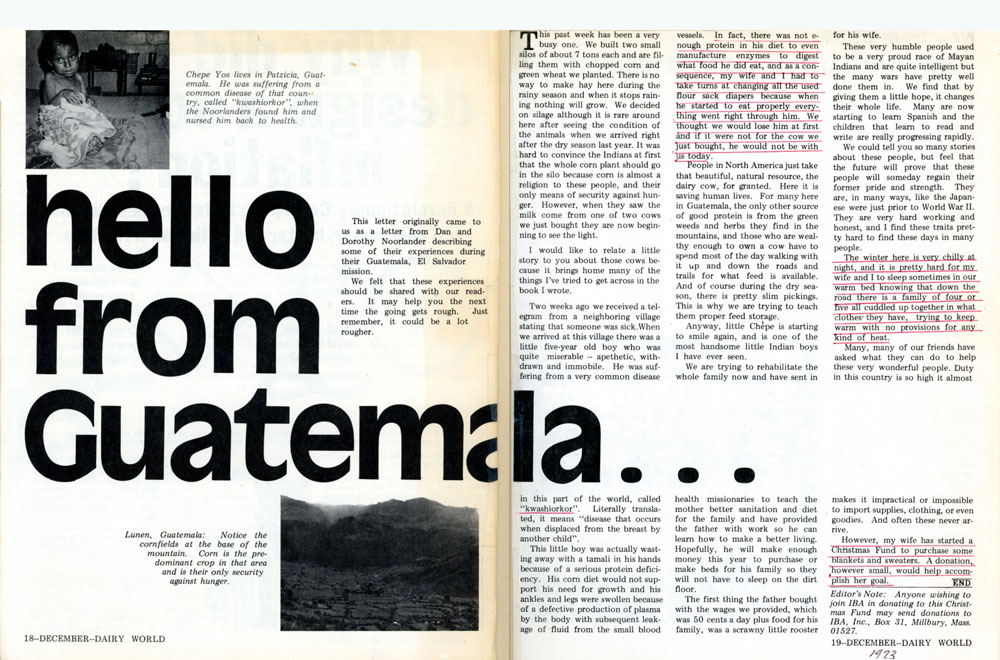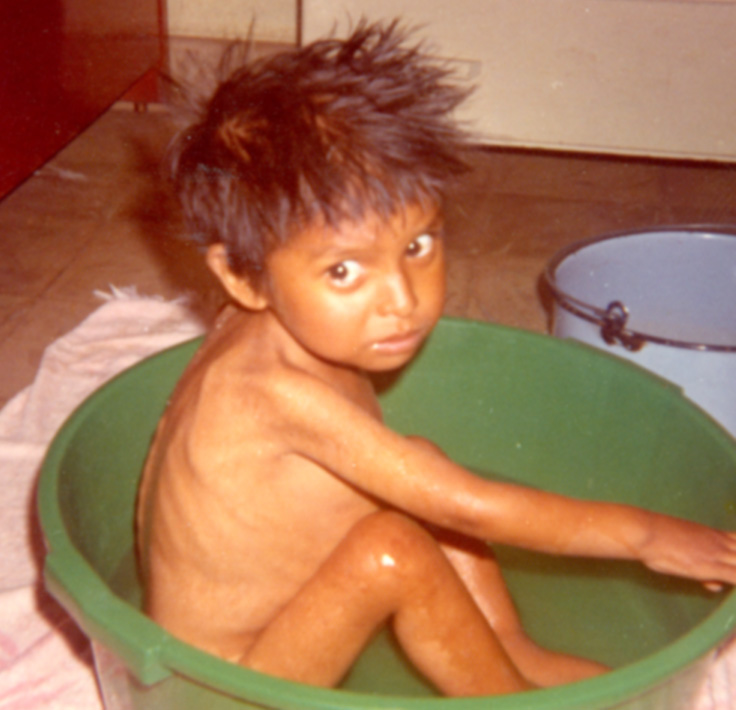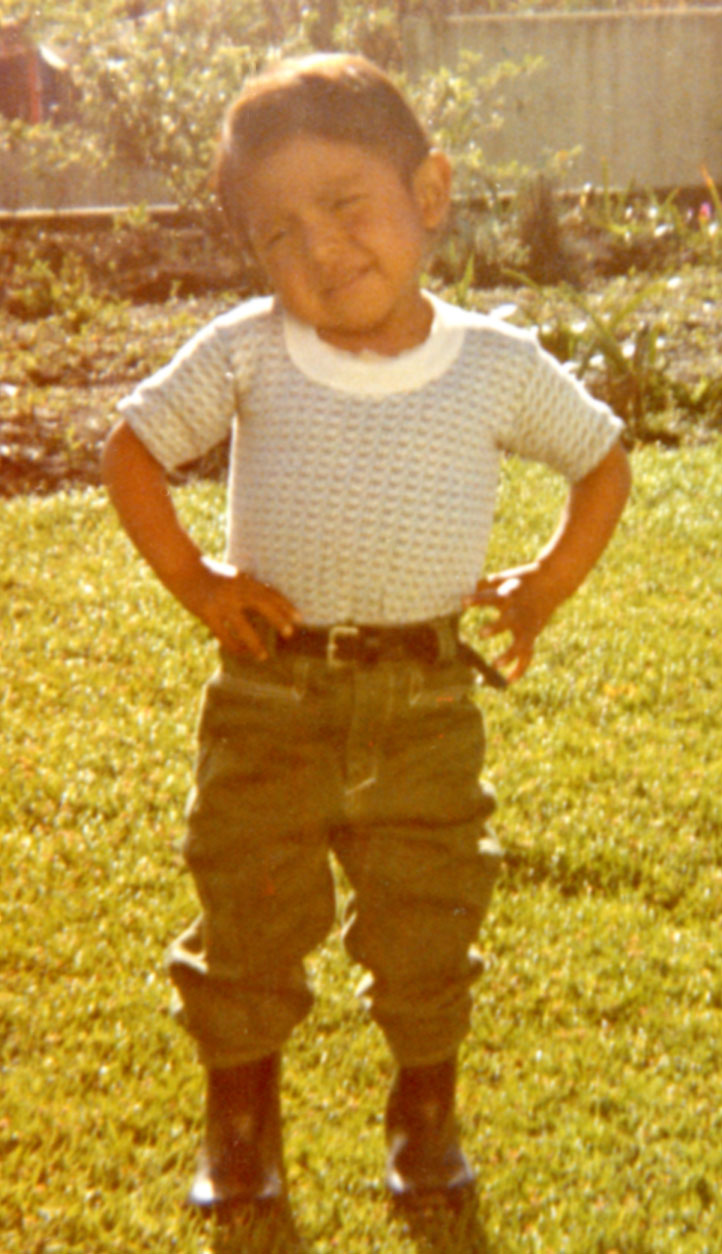Letter to IBA, Inc.
Update from Elder and Sis. Noorlander – 1973
Note from IBA
“This letter originally came to us as a letter from Dan and Dorothy Noorlander describing some of their experiences during their Guatemala-El Salvador mission.
“We felt that these experiences should be shared with our readers. It may help you the next time the going gets rough. Just remember, it could be a lot rougher.”
This past week has been a very busy one. We built two small silos of about 7 tons each and are filling them with chopped corn and green wheat we planted. There is no way to make hay here during the rainy season and when it stops raining nothing will grow. We decided on silage, which is rare around here. It was something we realized after seeing the condition of the animals after arriving at the end of the dry season last year. At first, it was hard to convince the Indians that the whole corn plant should go in the silo. Corn is almost a religion to these people, and their only means of security against hunger. However, when they saw the milk come from one of two cows we just bought they began to see the light.
I would like to relate a little story to you about those cows because it brings home many of the things I've tried to get across in the book I wrote.
Two weeks ago we received a telegram from a neighboring village stating that someone was sick. When we arrived at this village there was a little five-year-old boy who was quite miserable. He was apethetic, withdrawn and immobile, suffering from a very common disease in this part of the world called “kwashiorkor.” Literally translated it means “disease that occurs when displaced from the breast by another child.”
Chepe Yos having his first bath ever in our little green tub.
This little boy was actually wasting away with a tamali in his hands because of a serious protein deficiency. His corn diet would not support his need for growth. His ankles and legs were swollen because of the defective production of plasma by the body, with subsequent leakage of fluid from the small blood vessels. In fact, there was not enough protein in his diet to manufacture the enzymes needed to digest what food he did eat.
As a consequence, my wife and I had to take turns changing his used flour sack diapers when he started to eat properly. Everything went right through him. We thought we would lose him at first, and if it were not for the cow we just bought, he would not be with us today.
People in North America just take that beautiful, natural resource, the dairy cow, for granted. In Guatemala it is saving human lives. For many here the only other source of good protein is from the green weeds and herbs they find in the mountains. Those who are wealthy enough to own a cow have to spend most of the day walking with it up and down the roads and trails for what feed is available. And of course during the dry season, there is pretty slim pickings. This is why we are trying to teach them proper feed storage.
Anyway, little Chepe is starting to smile again, and is one of the most handsome little Indian boys I have ever seen.
This is what Chepe looked like two months later after getting a proper diet. Tortillas had been his only diet for five years.
We are trying to rehabilitate the whole family now and have sent in health missionaries to teach the mother better sanitation and diet for the family. We have also provided the father with work so he can learn how to make a better living. Hopefully, he will make enough money this year to purchase or make beds for his family so they will not have to sleep on the dirt floor.
The first thing the father bought with the wages we provided, which was 50 cents a day plus food for his family, was a scrawny little rooster for his wife.
These very humble people used to be a very proud race of Mayan Indians and are quite intelligent, but the many wars have pretty well done them in. We find that by giving them a little hope, it changes their whole life. Many are now starting to learn Spanish and the children that learn to read and write are really progressing rapidly.
We could tell you so many stories about these people, but feel that the future will prove that they will someday regain their former pride and strength. They are, in many ways, like the Japanese were just prior to World War II. They are very hard working and honest, and I find these traits pretty hard to find in many people these days.
The winter here is very chilly at night, and it is hard for my wife and I to sleep sometimes in our warm bed knowing that down the road there is a family of four or five all cuddled up together in what clothes they have, trying to keep warm with no provisions for any kind of heat.
Many, many of our friends have asked what they can do to help these very wonderful people. Duty in this country is so high it almost makes it impractical or impossible to import supplies, clothing, or even goodies. And often these never arrive.
However, my wife has started a Christmas Fund to purchase some blankets and sweaters. A donation, however small, would help accomplish her goal.
Sis. Noorlander tells Chepe’s story in a brief interview, which she gave in her 94th year. You can listen to it on the Photo Journal page.


